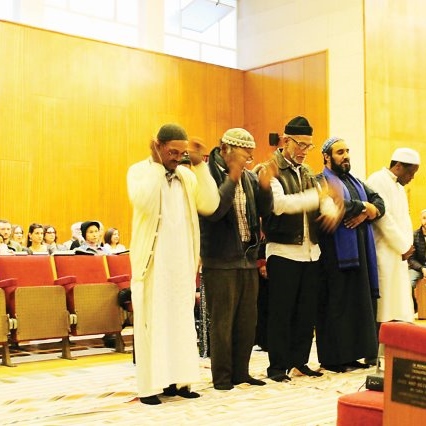
News

Breaking bread and boundaries at Ramadan Shabbat
TALI FEINBERG
“I get goosebumps standing here with you at this event,” said Jansen, the keynote speaker. “I cannot tell you how incredibly humbled I am to see this in our beautiful country. It doesn’t happen in too many places in the world.
“I want to thank your communities for your vision and foresight in understanding that when we share what we have, it does not make us less Jewish or Muslim – it makes us more human.”
Jansen said that as a Christian from an evangelical family, he saw the value of breaking down boundaries between religions. He told the Jewish and Muslim crowd that his father’s name was Abraham, his mother’s name Sarah, and his brother’s name Isaac.
Jansen pointed out that “grace was scandalous”, meaning that when people come together, forgive each other, or unite against a common cause, it’s so unusual that it makes other people angry. This response means we must look at ourselves and what we want for our society – especially now.
“What brings us together is much greater than what keeps us apart. At no other stage in human history is it more important for us to demonstrate the kind of grace that you have shown this evening, because we live in a very violent and dangerous world,” he said with regard to the recent massacres at places of worship in Pittsburgh in the United States and Christchurch in New Zealand.
“This is a response to that, and yet, when people get together, it causes alarm. So, thank you for your courage.” Jansen said that New Zealand Prime Minister Jacinda Ardern “redrew the boundaries of race, religion, culture, and identity” in her response to the Christchurch massacre. Her decision to wear a hijab when visiting the families of the victims, and by saying that “the people who died here are us, and the people who killed are not us” was a hugely important moment.
Canadian Prime Minister Justin Trudeau’s example of welcoming Syrian refugees into the country by standing on the tarmac with a blanket was another powerful gesture of leadership that our world desperately needs, he said.
Jansen said he had a photo from a previous Ramadan Shabbat gathering at Temple Israel, which he had shown to audiences all over the country, from schoolchildren to adults. “Every time I show this photo, I literally see the emotions. Because people know what that symbolism means.”
In thanking Professor Jansen, Rabbi Greg Alexander said that the event came about “because of wanting to redraw the lines. The progressive Jewish community starts with the questions, and not the answers, and we look at what we can do to create change. If these are not the walls we want to build, we must take them down, and redraw those lines.”
Melissa Fagan attended the event for the first time. She said it was especially important for her young boys. “They’ve never really had contact with other faiths, and don’t know enough about them. If we weren’t part of this congregation, they wouldn’t be exposed to this.”
She described the atmosphere as relaxed, with congregants mixing and chatting, while the Muslims broke their fast over tea and dates.
The Shabbat service followed, and the main meal included variety from both communities, ranging from chopped herring to samoosas. “It was wonderful to see how the two services fitted together, and after the meal, the Muslim community completed their prayers,” said Fagan.
She said Temple Israel would be hosted by the Open Mosque over Chanukah, which she looked forward to attending. “The evening made me realise that Muslims and Jews are really not that different to each other.”
Rabbi Alexander said Temple Israel had hosted Ramadan Shabbat for the past four years. “It is always a significant Shabbat as much for us as for our Muslim guests. When the mosque massacres happened in Christchurch in March, we immediately reached out to the Muslim community to show support. Especially here in Cape Town, there is no reason for Jews and Muslims to hate each other. There has been a long history of interaction between our communities, and this continues today.”




